Cardiovascular diseases are now the number one cause of worldwide mortality. It is also a well known fact that the deteriorating heart health is mostly common in the urban population of developed and developing countries. It raises the question about our food and lifestyle changes in recent times.
A healthy active body with a stress free mind hosts a healthy heart. Diet of natural, freshly prepared unprocessed food along with optimal physical exercise will keep the blood cholesterol, blood glucose and blood pressure in a normal range. This can be easily achieved by including heart healthy herbs in our day to day diet along with practice of yoga , pranayama and meditation .
According to Ayurveda, Heart is the seat of Prana Vayu, the vital force of life. It is considered one among the three “Marma” or structures in the body which needs to be protected at all times both from physical as well as physiological disturbances.
Ayurveda describes Hrid roga to be caused by the disbalances in any one of the doshas viz., vata, pitta or kapha or tridoshaja ( all three doshas together). Last category of hrid roga is caused by krimi (micro organisms) called krimija. All of them are dealt with appropriate drugs which can bring balance of the vitiated doshas.
In Yogic science, the heart corresponds to Anahata chakra, fourth primary chakra and centre for love for oneself and others, compassion, empathy and forgiveness. When the heart chakra is in healthy alignment you will be connected to the world around and open to experiences and challenges of life. The blocked energies can manifest as physical ailments involving heart, lungs, chest, arms and hands. Issues such as poor circulation, high or low blood pressure and recurrent infections of lungs can occur.
Ayurveda believes in bringing in health by treating the diseased by taking into account the changes happening in the entire body. Hence heart healthy herbs have been mentioned in various contexts in Samhitas. Some of the common drugs which are beneficial to the heart can be included in our daily lives depending on the needs of the individual.
Arjuna (Terminalia Arjuna)
Astringent qualities of Arjuna bark provides it great medicinal properties. The usefulness of its bark is well known among the tribal population and rural masses. You can often see the tree bark being taken out when you find it near you. Bark powder or decoction is useful to reduce the risk of heart diseases. It can strengthen and tone the heart muscles which helps in proper functioning of the heart. Studies suggest that the decoction of bark of arjuna helps in significant reduction of chest pain by lowering the level of cortisol in the body. It also increases exercise tolerance and improves HDL levels in the body. It can reduce blood pressure in people with stable angina.
Arjuna kwath: Decoction prepared with stem bark can be taken 10-20 ml everyday
Arjuna ksheerapak: 1 part of bark powder with 4 parts of milk and 16 parts of water is mixed together. This mixture is to be boiled till all the water is evaporated and milk remains. Ksheerpak can be consumed once it is cooled down to normal temperature.

Rasona( Allium sativum )
Garlic is a hot pungent cleansing spice which is an excellent cardiac tonic, a good digestive and also beneficial for skin ailments. It is a rare herb which has all the six tastes sweet, salty, astringent, pungent and bitter except sour. The pungency of garlic is due to the sulphur compounds contained in Garlic. This also is the reason garlic is used in skin ailments. It is good for heart health as it maintains a balance between good cholesterol levels due to its lipid lowering capacity. It prevents the formation of plaques in blood vessels and helps maintain an optimum blood pressure due to its antioxidant property.
Garlic possesses hot potency and digestive-carminative property (deepan-paachan) according to ayurveda. This avoids the build up of toxins(or the Ama) in the body. There are innumerable preparations and formulations of Garlic available in the market. One of the most popular classical ayurvedic preparations is Lasuna ksheerapak which can be made easily at home and consumed.
Lasuna ksheerapak : 1 part of crushed garlic in 4 parts of milk and 16 parts of water and boiled and reduced till the water is evaporated and milk remains. 10-15 ml of this preparation can be taken twice daily.
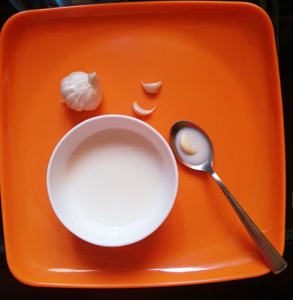
Pushkarmula( Inula racemosa )
Pushkarmula is part of the daisy family and used for its health benefits as well as ornamentally for its distinct yellow flowers and broad green leaves. It is a versatile herb that can be used in multiple medicinal benefits. It has a bitter pungent taste and a hot potency. These properties make it ideal for treating both heart diseases and respiratory ailments. It reduces the fat from the body hence it is found to be an ingredient in many herbal weight loss preparations. It is also known to be a good herb for reducing cholesterol and used in conditions of ischemic heart diseases. It works similar to beta-blocker and can help in lowering the blood pressure. It is one of the important herbs for treatment of COPD and asthma in Ayurveda.
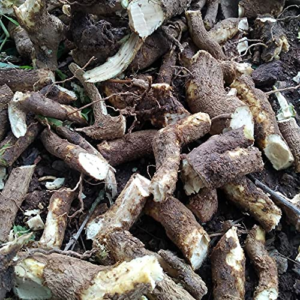
Vrikshamla ( Garcinia Indica )
Commonly known as kokum. The fruits of this tree are sweet, sour in taste and possess hot potency. They have great digestive properties and are well known as a coolant when used as juice or paanak. It is used well in various recipes in South Indian cuisine and popular for its pitta-nashak quality often used in summer drinks. Ayurvedic texts categorise it under Hridya or cardiac tonic. It is used in various preparations and formulations in ayurveda for the benefit of heart diseases.

Dadima ( Punica granatum )
Pomegranate might be a well known heart healthy fruit of modern day, but ayurveda has classified it as Hridya ( heart healthy ) in its materia medica ages before. It has got a sweet, sour and astringent taste and is supposed to have a neutral potency neither hot nor cold. Apart from the fruit, the root, root bark, and fruit skin are used in treatment methods. Pomegranate is one of the few herbs which has its effect in balancing all the three doshas. Pomegranate juice is used as anupana or adjuant along with several herbal preparations as it increases the digestive power and is an excellent carminative. Dadimastaka churna, Dadimavaleha, Lavana bhaskara churna are some of the popular classical formulations.
It is proven to be rich in antioxidants and hence also has a great beneficial effect on the body as a whole along with being an anti-aging herb. It is a rich source of vitamin C, Vitamin B5, Polyphenols and Potassium.
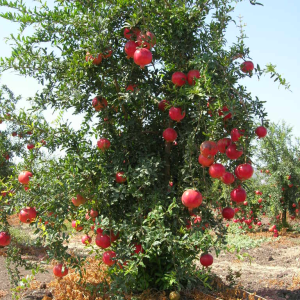
Yashtimadhu ( Glycyrrhiza glabra )
Liquorice or mulethi is known to all for its versatile medicinal properties. It is described as a rasayan or immunomodulator in Ayurveda. Its usefulness can be seen both on external application on skin, hair for wound healing etc as well as internal healing in case of chronic cough and fever. Along with Triphala, yastimadhu helps in control of cholesterol levels in the body and prevents atherosclerosis. It is classified in Jeevaniya gana in ayurveda and hence has been used as a rejuvenator. It is rich in antioxidants and hence considered as a heart healthy herb.
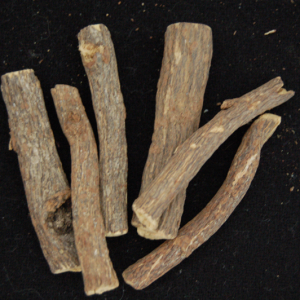
Sarpagandha ( Rauvolfia serpentina )
Sarpagandha or the snakeroot is useful in managing the symptoms of anxiety. According to ayurveda anxiety is mainly caused by the excess of vata dosha in the body. Vata is known to take care of all the movements and functions of the nervous system. Sarpagandha helps balance vata and reduce anxiety, insomnia and hence brings in the right amount of cortisol in the circulation. This reduces stress levels in the body.
Clinical research shows the evidence that sarpagandha with its alkaloid constituent Reserpine is effective in bringing down hypertension.
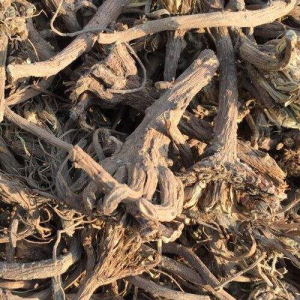
Apart from the single herbs there are other combinations of herbs such as Laghupanchamool, Panchavalkala and so on which are considered as heart healthy in Ayurveda.
Sour Food
According to Acharya Vagbhata, sour foods are naturally cardio-protective in nature. “Amlo hrudyanam” A bit of sourness in the fruits and vegetables we eat provides us with Vitamin C and help as a blood thinner along with aiding the digestive process. Many kinds of berries, amla fruit, tamarind, mango, pomegranate, lemon, buttermilk, dates, raisins and cherries are considered heart healthy.
Let us not forget the usefulness of other day-to-day spices in the kitchen such as Hing, Cardamom, Long pepper, Acorus (Vacha), Ginger, etc which have a positive effect on cardiac health.





